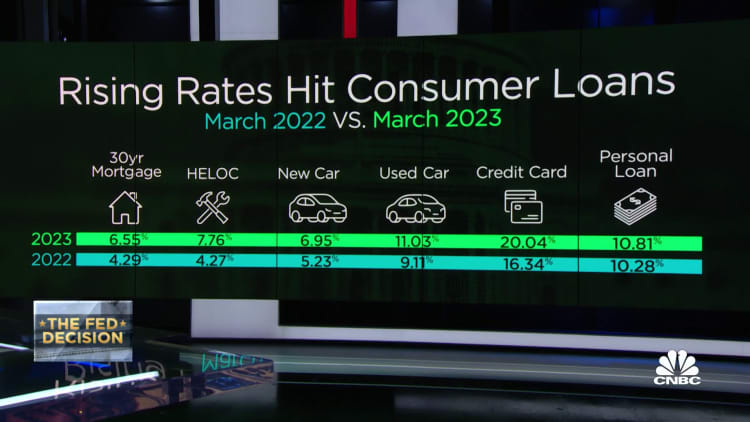Jose Luis Pelaez Inc | Digitalvision | Getty Images
Why having a credit card can be beneficial
Having a credit card — and using it responsibly — is a good way to start building strong credit, said Ted Rossman, senior industry analyst at CreditCards.com.
Establishing good credit is “essential” for qualifying for loans such as a mortgage or auto loan, and for other things such as buying a cell phone, renting a car or getting a job, the Consumer Federation of America notes. Strong credit also helps consumers qualify for lower borrowing costs.
Not everyone uses a credit card in a financially optimal way, however. Eighty-two percent of American adults had a credit card in 2022, according to the U.S. Federal Reserve. About half of them carried balances from month to month at least once in the prior year. Since credit cards often carry high interest rates, carrying a balance (i.e., not paying off a card in full each month) can add significantly to household costs.

Rossman recommends first-time cardholders get a card without annual fees and with zero-interest, at first, at least, and that they pay their balance in full and on time each month. It is important to make sure the interest rate will be relatively low after the initial no-interest offer runs its course.
There are virtues to sticking with just one card, experts said.
Among the biggest: There’s a simplicity to keeping track of just one set of due dates and other key details such as card benefits, said Bruce McClary, senior vice president at the National Foundation for Credit Counseling.
“If you’re limiting yourself to one card, it helps simplify the process of debt management,” McClary said.
Benefits to having more than one credit card
However, there can be drawbacks to having just one credit card. For one, not all businesses will necessarily accept your card brand.
“In those cases, in might make sense to have two different card types: Visa and Mastercard, for example,” McClary said.
Similarly, a consumer who operates a business can separate their personal and business expenses by using two cards, he added.
Consumers can prioritize a solid all-around card as a primary one, experts said. A good “foundation” for users may be a card with no annual fee that pays 2% cash back on all purchases, for example, Rossman said.
I would say two cards is optimum … and three would be maximum to keep finances simple.
Cathy Curtis
founder and CEO of Curtis Financial Planning
A second would likely be based on how consumers shop and how various cards divvy up rewards and benefits, experts said. For example, frequent travelers may benefit from a card geared toward travel rewards and comes without foreign transaction fees.
“This is where you have to make some choices for yourself,” McClary said. “You have to think about your daily life, where you shop and where you’ll be most likely to redeem the points you’re earning.”
Websites such as NerdWallet and CreditCards.com can help determine the best reward card for you, McClary said.
In addition, having a second credit card, or more, can help build a person’s credit utilization ratio, said Curtis, founder and CEO of Curtis Financial Planning.
Xavier Lorenzo | Moment | Getty Images
This is the ratio of what consumers owe relative to their total credit limit. Credit utilization is an important determinant in one’s credit score and having one that’s too high can reduce your score.
Cardholders should keep their ratio under 30% across all accounts, experts said. So, in a basic example, a consumer with a $10,000 credit limit wouldn’t want their balance to exceed $3,000.
Having more than one card raises one’s overall credit limit, and with responsible use, can reduce one’s credit utilization ratio.
“If a person needs more than one card to keep their credit utilization ratio low, then I would say that is a good reason to have more than one card,” Curtis said.
How many credit cards is too many?
But this is a balancing act.
Having too many cards can sometimes make users look like overeager borrowers and thereby reduce their credit score, even if they have low balances, McClary said. Lenders get the perception of a “compulsive borrower” if there are too many applications for credit in a short time frame, he added.
Spreading applications out — one or two in a six-month period, and no more than five in a two-year span — is generally safe, Rossman said. That includes applications for all types of debt.

Additionally, having multiple credit cards may add to the costs of carrying credit if they have annual fees, McClary said.
It’s “critical” for consumers who are disorganized or tend to overspend and carry balances on their cards, instead of paying their balances in full each month, to limit their cards, perhaps to just one, Curtis said.
“If a person is more fiscally responsible, I see no harm in having more than one card,” she said.
Generally, consumers should always strive to pay off balances each month, automate their monthly payments and secure a card with the lowest interest rate possible, she added.

